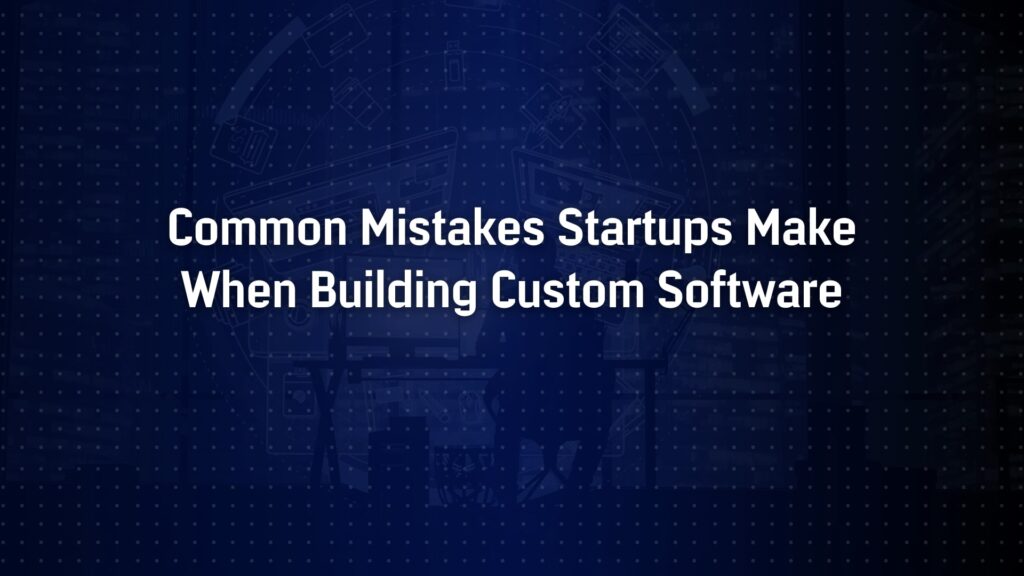Common Mistakes Startups Make When Building Custom Software
Custom software projects promise tailored solutions, yet many startups stumble on avoidable missteps. For example, one report warns that 90% of startups fail, often due to team or planning issues. Industry experts echo this: “Startups don’t fail because they can’t build a product. They fail because they build the wrong product.”
In practice, this means skipping key steps like defining scope, hiring wisely, testing thoroughly, and validating the market. The good news? Each risk can be managed with the right process and partner. Empyreal Infotech helps founders steer clear of these pitfalls by enforcing clear planning, smart hiring, built-in QA, and early customer feedback at every stage.
1. Scope Creep & Poor Planning
A classic startup trap is “scope creep”, adding features or changes mid-project without updating time or budget. Without a clear roadmap, a modest MVP can balloon beyond control. As one expert explains, inadequate planning “can result in scope creep, where project requirements expand beyond the initial scope, leading to budget overruns and delays.” In real life, imagine a founder who insists on tweaking every detail as development proceeds: suddenly, the app is late and over budget.
Avoidance Strategies
-
- Define a clear MVP and freeze requirements. Invest time upfront to write user stories, wireframes, or prototypes. Empyreal Infotech runs discovery workshops to document exactly what to build, so everyone understands the plan from day one.
-
- Use Agile sprints with change control. Limit mid-sprint changes. If new ideas emerge, evaluate them in a formal review meeting before shifting the plan. Empyreal’s project managers track scope in tools like Jira, flagging unplanned “nice to have” features until the core build is complete.
-
- Keep priorities focused on core goals. Bullet lists or simple matrices help founders decide which features truly solve the user’s problem. Empyreal coaches teams to concentrate on high-impact features, deferring extra bells and whistles until later.
Founder Story
When fintech founder Sarah started a project, she felt every extra feature was critical. By late 2024, she was three months behind schedule and far over budget. After working with Empyreal, she refocused on a lean core MVP (and agreed to postpone flashy extras). With a tighter scope and weekly reviews, she relaunched under budget. In short, Empyreal’s early planning sessions helped her catch and control scope creep before it became a crisis.
2. Poor Hiring and Team Mistakes
Rushing to build a team can backfire. Founders under pressure sometimes hire too quickly or prioritize cost over fit, a mistake that “can have far-reaching consequences for your software project, affecting timelines, budgets, and overall outcomes.” For example, hiring an inexpensive developer who is not familiar with your tech stack often means poorly written code that fails to meet expectations. Not only is time wasted, but fixing a bad hire can cost five times their annual salary once you include rehiring, training, and lost productivity.
Key Prevention Tips
-
- Hire selectively and purposefully. Only bring on new people when you truly need them. Full Scale advises startups that “you mustn’t hire too many people too quickly,” since scaling the team only when needed avoids financial strain. Empyreal carefully evaluates each role: we vet candidates or provide our own in-house developers whose skills match the project’s needs.
-
- Look beyond price. Low-cost hires or freelancers might lack commitment or expertise, leading to technical debt. PLANEKS warns that partnering with underqualified developers leads to “poorly designed software that fails to meet user expectations.” Empyreal instead builds teams of experienced engineers and uses technical assessments (coding tests, portfolio reviews) to ensure high quality.
-
- Ensure good cultural fit and communication. A single disruptive hire can demotivate the whole team. Empyreal treats each developer as a long-term partner: we promote clear communication, regular check-ins, and mentorship. Our goal is to have a stable, motivated team working on your project.
Recovery Path
Say a startup brought on two junior devs in a hurry, only to watch deadlines slip. They paused the project and asked Empyreal to audit the code. Empyreal found gaps, retrained the team, and even recommended adding a senior tech lead. Over time, code quality rose and morale improved. The project got back on track, showing that fixing hiring problems, though costly, was feasible with the right support.
3. Neglecting QA and Testing
Another common blunder is skipping thorough testing. Startups often rush to launch, only to find show-stopping bugs. In fact, experts report that “70% of startup failures are due to launching buggy products,” largely because inadequate testing left critical issues hiding in the code. For example, one new software tool’s “save” button stopped working for many users, and certain screens broke on mobile; these bugs “drove users away,” as the founder later admitted.
To Avoid This
-
- Build QA into every phase. Do not treat testing as a final checkbox. Use automated unit and integration tests throughout development. Empyreal’s teams set up continuous integration (CI/CD) pipelines so that each code change is automatically vetted. We also bring a QA engineer into sprint planning from day one, following advice like “involve a QA expert early to identify gaps before coding begins.”
-
- Combine testing methods. Mix manual and automated tests: functional tests cover core flows, exploratory testing tries to break the app, load tests check performance, and security scans look for vulnerabilities. Empyreal writes detailed test cases and even does prelaunch “bug bashes” with end users. We prioritize fixes by user impact, tackling show-stopping bugs first rather than chasing minor cosmetic issues.
-
- Iterate quickly on feedback. Find bugs early in development rather than after release. Even after launch, Empyreal collects user feedback to spot missed issues (a practice called UAT, User Acceptance Testing). By adopting a test-driven mindset, startups avoid piles of tech debt.
Founder Story
One SaaS startup rushed out a beta to seize a market opportunity, only to hear harsh user complaints about bugs and crashes. After halting marketing, they worked with Empyreal. We implemented automated testing and fixed the worst errors in a few days. When they relaunched, user satisfaction soared. In short, Empyreal’s disciplined QA process turned the product from fragile to formidable.
4. Skipping Market Validation (No User Feedback)
Perhaps the costliest mistake is building without validating whether customers want your product. According to Sachhsoft, “skipping market validation is one of the most expensive mistakes a startup can make.” Many founders fall in love with their idea and start coding, only to discover after launch that nobody asked for those features. Indeed, a CB Insights study shows companies burning through millions of funding before realizing there is no real demand. A notorious case is Juicero, which spent $120M on a Wi-Fi-enabled juicer until customers proved they could squeeze the proprietary juice packs by hand.
To Prevent This
-
- Talk to users first. Before writing much code, conduct interviews or surveys with your target audience. Use simple prototypes or landing pages to gauge interest (even offering a “preorder” or waitlist). Empyreal encourages founders to “Make something people want” by engaging real customers early. We often help create a demo webpage or sample UI to test demand.
-
- Start with an MVP and iterate. Resist the urge to build every feature. Build a Minimum Viable Product that solves one core problem, then improve it based on feedback. As one coach advises, focus on a lean first version and add features only when there is proof they are needed. Empyreal helps define that MVP scope and uses the Lean Startup methodology: build–measure–learn. For example, Dropbox founder validated with a simple demo video before coding; Empyreal might do something similar by mocking up the app.
-
- Use data and be willing to pivot. Track usage metrics or run A/B tests. If feedback suggests your idea needs work, pivot early. Empyreal analyzes any early user data to recommend pivots (maybe changing focus or reprioritizing features). We have seen several clients shift direction mid-project after realizing a key assumption was wrong.
Founder Story
A fitness app startup built 50+ features before talking to users. When they finally soft-launched, adoption was dismal; people did not understand or need most features. After consulting Empyreal, they scrapped the excess and resurveyed their market. It turned out users simply wanted a meal tracking tool. By launching a slimmed-down MVP and marketing it to that audience, they regained traction. This turnaround was only possible by adding the validation step that Empyreal had advocated from the start.
Conclusion: Build Smart, with Empyreal Infotech
In summary, the biggest mistakes in custom software projects are organizational, not technical: unchecked scope, the wrong team, poor testing, and no customer validation. Each can doom a startup’s vision, but each can also be fixed or prevented with discipline. As Eric Ries said, it is better to fall in love with solving a real problem than with your initial feature list.
At Empyreal Infotech, we help founders avoid these traps. Our process combines rigorous planning (to lock down scope), strategic team assembly, continuous QA, and customer-driven design. We act as a partner and advisor: setting up Agile sprints, vetting developers, writing test plans, and guiding validation experiments. By following these best practices, startups can transform risky projects into success stories. Founders and product managers who embrace planning, hire wisely, and test with real users give their software the solid foundation it needs. With Empyreal Infotech’s experience and methods at your side, you can build custom software that is not only innovative but also built right and built for real customers.




